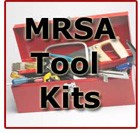MRSA (Methicillin resistant Staphylococcus aureus)
MRSA or Methicillin–resistant staph aureus is a type of infection that is resistant to many antibiotics. MRSA skin infections are generally spread by skin-to-skin contact or by direct contact with the drainage from an infected wound. Research indicates 85% of all serious cases of the infection are associated with health care settings, while the remaining 15% of reported infections are considered community-associated. Community-associated MRSA can be spread by contact with contaminated surfaces or items such as sports equipment or personal hygiene items.
Featured Topics
- MRSA Pamphlet
- MRSA Fact Sheet
- MRSA Toolkits for Athletic Directors, Coaches, School Health Teams, Parents, Athletes, and Students
- Methicillin-Resistant Staphylococcus Aureus (MRSA) Infections Report and Recommendations of the Tennessee Department of Health Infections Taskforce January 2008
- Invasive Methicillin-Resistant Staphylocccus Aureus (MRSA) Reporting in Tennessee 2008
Learn More
The Tennessee Department of Health offers the publication “Living with MRSA” here. This publication is also available in Spanish here. It provides helpful information on how the illness is treated, as well as how to treat yourself, care for others and properly clean your home in the event of a diagnosis.
For more information on MRSA, visit the Centers for Disease Control and Prevention by clicking here.
Healthcare providers, laboratories, and public health professionals can find more information about this disease and a variety of others at the Tennessee Department of Health Reportable Diseases and Events home page http://apps.health.tn.gov/ReportableDiseases/ReportableDisease.aspx
Signs and Symptoms
Often an infection will look like a spider bite, a boil (large red, painful bump under the skin), a cut or blister that is swollen and filled with fluid, or a turf burn. It is important to report any suspicious skin infection to your health care provider immediately.
The Numbers
In Tennessee, there were more than 1,800 invasive cases of MRSA in both 2005 and 2006. An invasive case occurs when the infection is found in organs other than the skin. As of September 30, 2007, there were 1,400 diagnosed cases of MRSA in Tennessee.
Stopping the Spread
Steps to decrease the possibility of developing MRSA include:
- Washing hands frequently with warm, soapy water.
- Using 60 %alcohol-based hand gel if soap and water are not available.
- Keeping hands away from the face, including the nose, eyes and mouth.
- No sharing personal items like make-up, bar soap, razors, towels, washcloths, clothes or athletic equipment.
- If participating in sporting activities or exercise, showering immediately afterwards, washing with soap and hot water.
- Washing towels, washcloths, and practice uniforms after every use in hot water and soap, and drying in a hot dryer.
- Avoiding contact with the skin infection of others.
MRSA Toolkits



This toolkit has been designed to help prevent and stop or reduce the spread of Methicillin resistant Staphylococcus aureus (MRSA) skin infections in middle and high schools. It contains educational materials targeted to the school health team, athletic directors/coaches,custodians, athletes/students and parents.
We suggest that you review all the materials provided in all sections and use them appropriately to fit your situation.